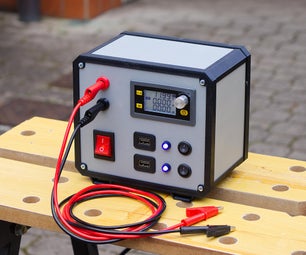Introduction: TABULED
I found a really interesting project called MORPHING CLOCK by HariFun.
This project uses a P3 panel 64X32 (2048) rgb leds.
I immediately started to build it but there was a problem with the connections because of too many Dupont cables.
By means of my CNC to create printed circuits (CIRQOID), I made a prototype to make easier the use of the P3 64x32 panel. After some tests I made it compatible with the P3 64x64 panel because I am going to introduce a solar energy project at the MAKER FAIRE ROME European Edition in October 2019.
I called my project TABULED, from latin TABULA (i.e. a small wax tablet used by the ancient Romans to write) and English word LED, as acronym of Light Emitting Diode
Step 1: Panel 64x32
This is the back of the 64x32 panel. As you can see everything is ready for a quick installation as only power supply is needed
Step 2: Panel 64x64
And this is the back of the 64x64 panel.
Step 3: Particular Components (or Special)
Who has already built MORPHING CLOCK knows that we do not need unusual or rare parts.
Simply we need a D1-MINI (also version 2.0) and a 5V power supply of at least 2A. To be able to use the printed circuit board so that the assembly is easier, faster, and cleaner, we need also some accessories that we hardly already have in our electronics drawers.
The picture shows what I used :
1. MICRO USB to DIP Adapter connector, so that you can use a power supply for RASPBERRY, which already has this type of socket.
2. DG128 KF128-2P spacing 5.08MM. A screw connector to use the + and - cables directly from any power supply.
3. 3.81mm Pitch Right Angle Pin Male. See the step number 2. The difference here is that the connector (male-female type) can be detached. The outlet no. 2 and no. 3 can be used instead of no. 1 and vice-versa.
4. FHP-08-01-T-S. The most difficult and expensive part of my research: the connector to power the panel. Each one cost about 1.5 euros and I had to buy it on DigiKey (in Europe) because on Aliexpress market it is not available. To save a few cents I used only 2 of the 4 contacts because they are enough to power 2A needed to the panel. I cutted a 2x8 pin connector to build 2x2 connectors.
5. 16P 2.54mm Socket Header Connector Right Angle to be able to connect the panel IN and OUT. Perhaps we
could also use a 2x3 but it is more expensive because with the 2x8 you use the cable that usually the seller sends along with the panel.
As you can see in the image, I designed the pcb board to be compatible with both 64x32 and 64x64 panels
Step 4: Schematic of TABULED
On the left there is the circuit diagram I made with DESIGNSPARK, it concerns the project to be presented to the MakerFaireRome in October 2019, as I said before.
As you can see, there are additional parts not needed for the MORPHING CLOCK, so no need to install them.
It could be useful to install only R1 and LED1 to be sure that everything is powered, even if in fact the blue LED of the D1-Mini already gives us this information.
On the right you can see two of ten pcb prototypes that i made before printing the final pcb.
Step 5: My Advice for You
I advise you to keep the D1-MINI at the height of 4 mm from pcb. The model that I used has the USB programming socket at the top, while in other devices (for example the Ver. 3.0) it is placed on the bottom and if the board is too low you can not insert the USB plug.
As a thickness I used a single pin strip 2.54 without needle.
For data input connector you can use the single row female 2.54mm female connector that is supplied together with the D1-MINI
Step 6: Price
My intention was not to sell this pcb but there have been many requests made by other users who already know it.
Before update info, the only pcb price was € 7.00.
Pcb and parts n. 1, 2 or 3, 4 and 5 were sold for € 12.00.
---- UPDATE -----
NO MORE PCB AVAILABLE. ALL WERE SOLD.
NOW ONLY A FEW COMPLETE PCBs ARE AVAILABLE WITH ALL COMPONENT SOLDERED. MUST ONLY BE PROGRAMMED.
Price of kit (without panel) is € 20.
Please note that connector 2 and 3 are not longer included.
Due to the different packaging, here is the updated shipping costs :
Registered shipping (tracking information available) to Europe is € 15.00
Registered shipping (tracking information available) to outside Europe is € 35.00 (except Customs fee)
Registered shipping (tracking information available) to Australia must be calculated










